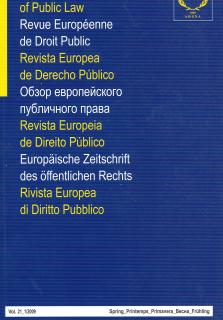
L’ouverture de l’ordre juridique de l’État
aux actes de puissance publique Étrangers
(L’exemple des instruments de l’union europÉenne
en matiÈre d’immigration)
(The Opening of the State’s Legal Order to Foreign Acts carried out in the Exercise of Public Powers
(The Example of the European Union Instruments in the Field of Migration)
Université Jagellonne, Cracovie, Pologne
International cooperation can lead States to open their internal legal order to legislative or individual acts produced by a foreign holder of public power - either a foreign State or an international organisation. This opening can take two main forms: 1) a State can authorise another State or an international organisation to undertake actions on its territory, 2) a State can decide that a legal measure taken by a foreign power can produce results on the internal legal order of the State taking this decision. This last form of opening of the internal legal order, covering very different scenarios, is called recognition of the foreign legal act. In some cases, this recognition amounts to a transfer of competence to a foreign State or an international organisation. The opening of the internal order to the acts of a foreign public power can create constitutional problems, mainly if the State recognising the act does not have sufficient means for screening the effects of these acts. The transfer of competences leads to a complicated muddle of States’ and international organisations’ competences and has a significant influence on the exercise of non-transferred State competences.
La coopération internationale peut conduire les Etats à ouvrir leur ordre juridique interne à des actes normatifs ou individuels produits par un détenteur étranger de pouvoir public - soit un Etat étranger soit une organisation internationale. Cette ouverture peut prendre deux formes principales: 1) un Etat peut autoriser un autre Etat ou une organisation internationale à entreprendre des actions sur son territoire; 2) un Etat peut décider qu’un acte juridique pris par une puissance étrangère produit des effets dans l’ordre juridique interne de l’Etat qui prend cette décision. Cette dernière forme d’ouverture de l’ordre juridique interne, qui couvre des cas de figure très différents, est appelée reconnaissance de l’acte juridique étranger. Dans certains cas cette reconnaissance équivaut à un transfert de compétences à un Etat étranger ou une organisation internationale. L’ouverture de l’ordre interne aux actes de puissance publique étrangers peut créer des problèmes constitutionnels, surtout si l’Etat qui reconnaît l’acte ne se réserve pas de moyens de filtrage suffisants des effets de ces actes. Le transfert de compétences aboutit à des enchevêtrements complexes de compétences des Etats et des organisations internationales et influe d’une façon considérable sur l’exercice des compétences étatiques non transférées.





















